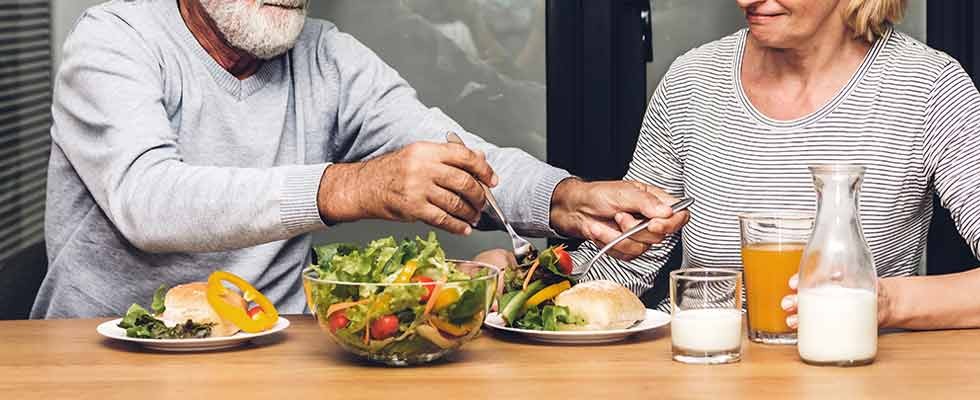
Most seniors living in the United States hope to remain at home for as long as possible. Some prefer to retain their independence and be in charge of their own schedule, while others want to stay in the home where they have built a life. Caregivers often want to do everything in their power to meet the wishes of their aging loved ones—but doing so can be all-consuming. Family caregivers spend an average of four years providing more than 24 hours of care per week, while nearly 1 in 4 caregivers spend 41 hours or more per week providing care. This is where a homecare agency can step in and provide help.
Healthy Meals for Healthy Lives
One of the best tools to help seniors age in place is a healthy meal delivery service. The simple task of preparing a meal, which once might have brought pleasure, can be daunting for seniors with limited mobility and declining strength. Others may have difficulty grocery shopping due to limited mobility or simply may not want to cook for themselves, especially if they are experiencing mental health issues or symptoms of depression.
From the caregiver perspective, many find that cooking healthy meals is not part of their job description, or that they can’t meet the senior’s tastes and preferences, and aides can’t be in the house all the time. The cycle of shopping, cooking and cleaning repeats endlessly and meals require creativity that can be difficult to reproduce.
Keep in mind that there is a major difference between a meal and a meal that is rich in essential nutrients that support healthy aging. Seniors often have specific nutritional needs that may be confusing for a senior or caregiver trying to handle meal planning on their own. Combine these heightened nutritional needs with the complexities of managing a health condition and remembering medications, as well as other daily tasks, and senior health and nutrition can be a lot to keep track of. For homecare agencies looking to provide additional services to their clients, partnering with a meal delivery company can help ensure nutritional needs are met.
Key Senior Nutrition
A meal delivery service makes it easy for seniors or their caregivers to keep track of their diet and be sure they are getting the nutrients they need. Good nutrition is important at every age, but certain nutrients become increasingly critical in the golden years. Some of the primary components of adequate senior nutrition are calcium, vitamin D, vitamin B12, protein, dietary fiber and omega-3 fatty acids. Here’s why:
- Calcium and vitamin D are vital for bone health, which is important to reduce the risk of osteoporosis and bone fractures.
- Vitamin D can also protect from a number of chronic conditions such as rheumatoid arthritis, cancer and autoimmune diseases.
- Vitamin B12 plays a role in red blood cell formation, cell metabolism and nerve function and also helps to prevent certain types of anemia.
- Protein is important to preserve muscle mass and strength with age, helps support a strong immune system, and aids in wound healing.
- Dietary fiber supports digestive and heart health and can help manage weight and blood sugar.
- Omega-3 fatty acids help reduce inflammation in the body, limiting the risk of or aiding in the fight against chronic diseases such as heart disease, cancer and arthritis.
A senior-focused meal delivery service will understand which nutrients are most important for the aging person and will make sure to provide meals that are well rounded and nutritionally complete.
Sodium, potassium and vitamin C should also be considered vital for optimal senior health. Sodium is an important mineral and electrolyte, though too much in the diet increases the risk of high blood pressure, cardiovascular disease, stroke and heart attack. Most people in the United States consume more than the recommended dietary allowance of sodium. If seniors reduce their salt intake and increase their intake of potassium—a key mineral and electrolyte that works with sodium to regulate nerve impulses and muscle contractions—they may lower high blood pressure and stave off chronic diseases.
Vitamin C helps support eye health and protects from cataracts, which can negatively affect vision and mobility. A good senior-focused meal delivery service should be able to balance meals and consider the delicate equilibrium of senior diet and nutrition, especially because as people get older, mealtimes may be forgotten and feelings of hunger might be dulled.
Picking a Partner
When looking for a meal delivery service to partner with, make sure it places an emphasis on senior nutrition, health and safety. The right meal delivery service can lighten the workload for the caregiver who is stretched too thin. It should simplify the confusing requirements of senior health and nutrition by giving seniors and their caregivers fewer things to worry about.
Many senior meal delivery services will deliver meals directly to the front door, eliminating the need for meal preparation and grocery shopping. This is an added benefit, especially during the time of COVID-19, when seniors are sheltering in place to reduce exposure to the virus.
When an agency partners with a healthy meal delivery service, seniors can remain independent for longer and families can feel confident that their loved ones’ nutritional needs are being taken care of. Even if you decide not to partner with a meal delivery service, with a few diet tweaks and proactive considerations for caregiver abilities, seniors can enjoy proper health and nutrition well into their golden years.
